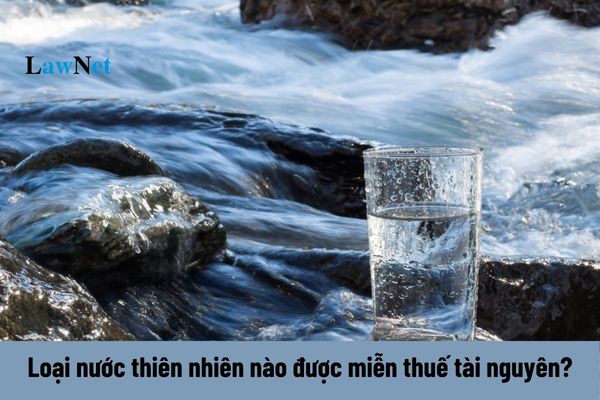Which types of natural water are exempt from severance tax in Vietnam?
Which types of natural water are exempt from severance tax in Vietnam?
Article 9 of the 2009 Law on severance tax, amended by Clause 2, Article 4 of the 2014 Law on Amendments to Tax Laws, provides for tax exemptions and reductions as follows:
Exemptions and Reductions in Tax
- Taxpayers facing natural disasters, fires, unexpected accidents causing damage to the declared and taxed resources shall be eligible for tax exemption or reduction for the damaged resources. If tax has been paid, the paid tax shall be refunded or deducted from the severance tax due for the subsequent period.
- Exemption from tax for natural seafood.
- Exemption from tax for branches, tops, firewood, bamboo, rattan, nứa, mai, giang, tranh, vầu, and lô ô exploited by individuals for household use.
- Exemption from tax for natural water used for hydroelectric production by households or individuals for domestic consumption.
- Exemption from tax for natural water exploited by households or individuals for domestic consumption.
- Exemption from tax for land exploited and used on-site within granted or leased land areas; land exploited for leveling, construction of security, military, or dike works.
- Other cases for tax exemption or reduction as prescribed by the Standing Committee of the National Assembly.
Thus, the types of natural water exempt from severance tax include:
- Natural water used for hydroelectric production by households or individuals for domestic consumption.
- Natural water exploited by households or individuals for domestic consumption.

Which types of natural water are exempt from severance tax in Vietnam? (Image from the Internet)
What is the severance tax rate for natural water in Vietnam?
Article 7 of the 2009 Law on severance tax specifies the tax rate for severance tax as follows:
| No. | Natural Water | Tax Rate (%) |
|---|---|---|
| 1 | Natural mineral water, natural hot water, bottled or canned purified natural water | 8-10 |
| 2 | Natural water used for hydroelectric production | 2-5 |
| 3 | Natural water used for production, business, excluding water specified in point 1 and point 2 of this group | |
| 4 | Surface water | 1-3 |
| 5 | Underground water | 3-8 |
How is the taxable resource output of natural water determined in Vietnam?
Clause 5, Article 5 of the 2009 Law on severance tax provides regulations for determining the taxable resource output as follows:
Taxable Resource Output
- For resources exploited, where the quantity, weight, or volume can be determined, the taxable resource output is the actual quantity, weight, or volume extracted during the tax period.
- For resources exploited where the actual quantity, weight, or volume cannot be determined due to various substances and impurities, the taxable resource output is determined based on the quantity, weight, or volume of each substance obtained after screening, sorting.
- For resources not sold but used in producing other products, if the actual quantity, weight, or volume cannot be directly determined, the taxable resource output is determined based on the production output during the tax period and the resource usage norm per unit of product.
- For natural water used in hydroelectric production, the taxable resource output is the electricity output that the hydroelectric facility sells to the purchaser as per the sales agreement or the transferred output when no sales contract is available, determined by a measurement system meeting Vietnamese quality measurement standards, with confirmation from the buyer, seller, or related parties.
- For natural mineral water, natural hot water, and natural water used for industrial purposes, the taxable resource output is determined by cubic meters (m³) or liters (l) according to a measurement system that meets Vietnamese quality measurement standards.
- For resources extracted manually, sporadically, or with non-regular mobile exploitation, where the projected annual extraction value is less than 200,000,000 VND, the extraction output is estimated seasonally or periodically for tax calculation. The tax authorities collaborate with relevant local agencies to determine the contracted extraction output for tax purposes.
The Government of Vietnam provides detailed regulations on this Article.
Thus, the taxable resource output for natural mineral water is determined by cubic meters (m³) or liters (l) following a measurement system that meets Vietnamese quality measurement standards.
The taxable resource output for natural water used in hydroelectric production is determined by a measurement system that meets Vietnamese quality measurement standards, confirmed by the buyer, seller, or related parties.
Which entities are the taxpayers for natural water resources in Vietnam?
According to Article 3 of the 2009 Law on severance tax, amended by Clause 2, Article 67 of the 2022 Petroleum Law, it is stipulated as follows:
Taxpayer
- severance taxpayers are organizations or individuals exploiting resources subject to severance tax, except in cases involving resources mined for post-extraction from mines, mine groups, or oil plots as per petroleum law.
- In specific cases, severance taxpayers are defined as follows:
a) For a resource-exploitation enterprise established through a joint venture, the joint venture is the taxpayer;
b) In business cooperation contracts for resource exploitation involving Vietnamese and foreign parties, tax responsibilities must be specifically defined in the business cooperation contract;
c) Organizations or individuals conducting small-scale, ad-hoc resource exploitation and selling to collecting agents, if the collecting agents have consented in writing to declare and pay tax on behalf of the extractor, then the collecting agents are the taxpayers.
Thus, the taxpayers for natural water resources are organizations or individuals engaging in the extraction of natural water resources.

